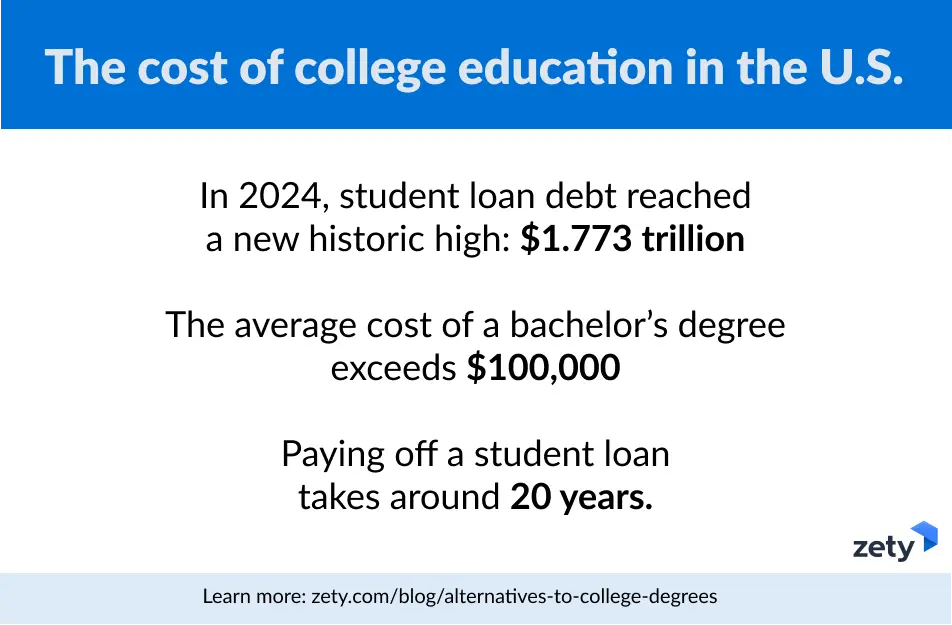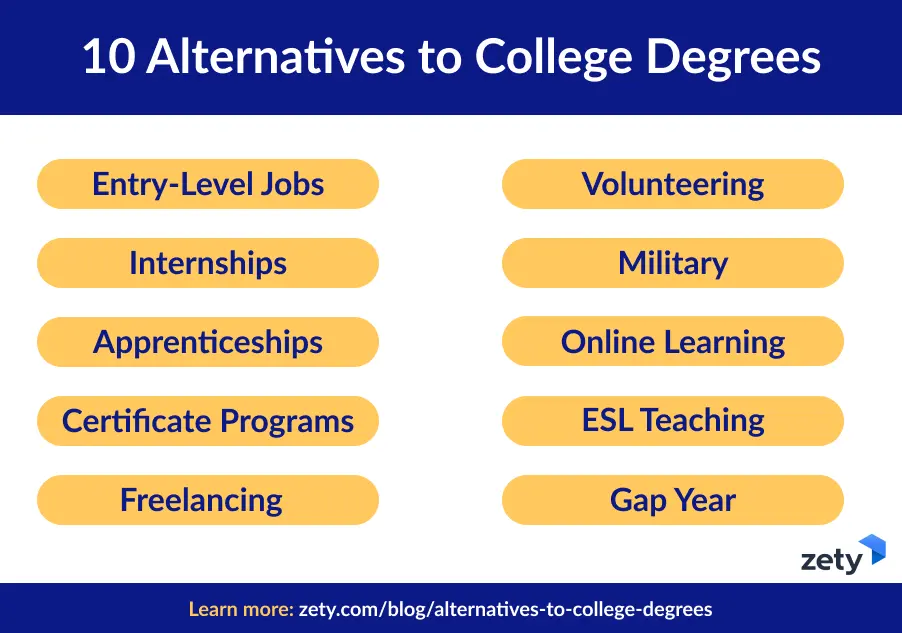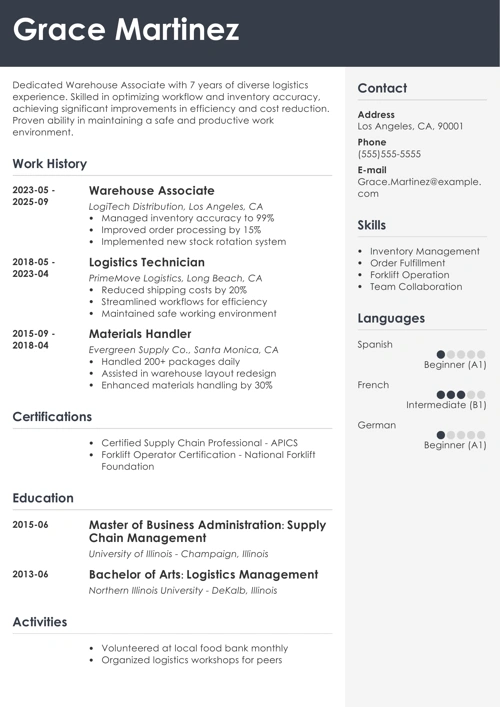In 2024, the total national student loan debt reached a historic high (yes, again.) Hey, guess what? You don’t have to start your adult life with over a hundred thousand $ in debt. There are other ways to learn new skills, get useful experience, and even start a career right out of high school. I will show you a selection of the 10 best alternatives to college degrees that can fit any budget and make a big difference in your life and career opportunities.
Key Points:
- Affordable alternatives to college education can help you save over $100,000 in student loans.
- Entry-level jobs and freelance work develop employability skills and offer real-life experience.
- High-school graduates can continue learning through apprenticeships, internships, and certificate programs, as well as online.
- Volunteering abroad and teaching ESL are great ways to combine travel and learning.
Are College Alternatives a Good Idea?
The short answer is: it depends.
Do you have a dream career that requires a degree, such as law or medicine? Then pursue a college education to follow that dream. However, if you’re graduating from high school without a clear idea of what you want to do in your future, then considering alternatives to college is wise.
In 2024, student loan debt in the US reached $1.773 trillion. On average, a student living on campus at an in-state public university pays $108,584 for a bachelor’s degree. Plus, every year, you’ll have to pay around $2,636 in interest. To sum up: it will take you around 20 years to pay off your student loan.

Not having a degree doesn’t mean you’ll be forced to work low-paid jobs all your life. Multiple well-paid professions don’t need a 4-year university education. Additionally, there’s an increase in the number of large companies that drop degree requirements for mid-level positions.
Are there significant benefits to college alternatives? Apart from saving a lot of money, other key advantages include acquiring real-life knowledge and skills, getting work experience right after high school, and gaining time to consider your future profession.
10 Alternatives to College Education
I’ve analyzed dozens of options available to high-school graduates and came up with these 10 best alternatives to college degrees. Learn about their pros and cons so you can get a better idea of what you could do after high school.
1. Entry-Level Jobs
Getting a job right after high school may sound scary. But consider this: you’ll have your own money, finally. Additionally, you’ll gain real-life work experience.
Entry-level jobs are good opportunities to develop interpersonal skills such as communication, time management, and collaboration. They may also give you a better idea of your strengths and weaknesses, which helps you to decide what you want to do and what you don’t want to do in the future. For example, working as a waiter can make you realize that you enjoy working in a dynamic environment, but you’re not very keen on having direct contact with customers. Going to work will also teach you a thing or two about filling out tax forms, getting insurance, and organizing your work time efficiently—all of this probably sounds boring, but it’s a part of adulting that colleges don’t teach.
Are there any disadvantages? Of course—you may get a job you’ll hate and feel miserable. You may also get FOMO when hearing about your friends’ college lives.
2. Internships
Internships are a great way to learn what various professions entail without committing to a 4-year degree straight away. Depending on your interests, you can find internships focused on humanities, STEM, and natural sciences; they’re offered by public institutions, government agencies, and NGOs. You can also apply for internships at private businesses.
The benefits? You’ll gain new knowledge and develop various soft and hard skills. Plus, completing an internship looks good on a resume. The downside? Many internships are unpaid, and some may not teach you much. Make sure to research the program you’re interested in to see what previous participants say about it.
3. Apprenticeships
Apprenticeship programs combine paid work, on-the-job training, and classroom education. Some may provide you with a certificate and even a degree upon completion. While many people associate apprenticeship with construction trades, other popular choices include careers in nursing and childcare, as well as teaching assistants, electrical workers, software developers, and beauty specialists. The number of offered programs is growing together with their popularity: there were almost 600,000 active apprentices in 2022.
The downsides of apprenticeship programs are similar to those of working after high school: you may feel burdened with responsibilities and miss out on the college experience.
4. Certificate Programs
If you want to continue learning without going into debt, certification can be your entry ticket to a successful career. Here’s an example: a medical coder’s median pay is $48,780 per year, and a Certified Professional Coder's training price starts at $2,799. Yes, obtaining a certificate requires money and time, but it’s a much smaller investment than a college degree.
It’s not all gold, though: some certifications may require relevant experience or a bachelor’s degree.
5. Freelancing
Do you have skills that you can monetize? Why not try working freelance—it will help you earn money while leaving time to pursue other activities. Popular freelance jobs include content creators, photographers, writers, social media managers, virtual assistants, and web designers. It can be a great idea if you’re thinking about pursuing a creative career in the future. It will teach you how to run your own business, organize work, manage time, and negotiate with clients. Freelancing might be just a side hustle you’ll drop once getting a full-time job; it may also turn into a full-time business that will grow in the future.
There’s one obvious disadvantage: you must have a few sought-after skills in the first place.
6. Volunteering
There are thousands of volunteer opportunities in and outside the U.S. Specific roles and responsibilities can vary depending on the organization and your skillset. One thing is certain, though: helping others will benefit you in many ways. You’ll meet inspiring people, learn more about the world, and develop new skills. Volunteering can also give you a clearer idea of what you want to do in the future.
Are there any disadvantages? Volunteer work is unpaid. It’s obvious, but you need to remember that when deciding how much time you can commit. Plus, it’s worth checking out what former volunteers say about the organization to avoid unpleasant experiences.
7. Military
The U.S. Army boasts over 200 types of job specialties. After completing basic training, you get access to Advanced Individual Training that includes engineering, logistics, aviation, medical, and other schools. Plus, the Army offers scholarship programs helping to pay tuition. Need more incentive? Many military careers are highly transferable to civilian jobs.
However, there are significant downsides to joining the army: first, you must be in great physical shape to join and complete training. Second, you may end up in combat zones, risking your life. Additionally, military enlistment means being away from your loved ones.
8. Online Learning Platforms
If you want to learn specific skills and skip the so-called college lifestyle, online learning can be a great alternative to a 4-year degree. Popular platforms such as Udemy, Coursera, and Khan Academy can teach you how to code, manage projects, analyze data, design prototypes, and much more. Many platforms offer free courses you can try, with the option to pay for a certificate upon completion. It’s a great way to improve your knowledge in your free time.
As for downsides: the quality of courses may differ, so not all of them may be worth the time. Plus, you must know what you want to learn in the first place; otherwise, you’ll end up browsing through course catalogs for hours, not knowing what to pick.
9. ESL Teaching
Would you like to work and travel at the same time? Then ESL teaching might be just the opportunity for you. If you obtain a TESOL certification, you’ll be qualified to get a teaching job in many countries. Large schools usually cover the cost of accommodation and flights. Salaries may not be lucrative but rather competitive for a given country. It’s a great way to see the world, meet new people, and experience other cultures. I did it for almost five years in the past, and I recommend it to anyone—you can improve your communication skills, develop resilience, and build confidence.
Disadvantages include being far away from home: living in a foreign country involves daily difficulties, so it requires patience and adaptability. Also, beware of scammers; always research the school and talk to its former teachers to learn about their experiences.
10. Taking a Gap Year
No, gap years aren’t only for bougie kids. A gap year looks different for everyone, as some spend it working full-time to save money for college, while others flex about their adventures on TikTok.
Think of it this way: it might be your opportunity to do something you’ve wanted to do for a long time but couldn’t because of school responsibilities. Maybe you’ve wanted to take scuba-diving lessons in Hawaii, go to a yoga course, or walk the Appalachian Trail for years. Taking a year-long break can bring a new perspective to your life. The best approach is to work for a few months and save money to spend the rest of the year pursuing a dream or expanding your horizons.
Disadvantages? Unless you’re old money, you’ll have to earn some in the first place. Having so much freedom can feel overwhelming, so it’s good to plan your gap year activities ahead of time so you don’t end up bed-rotting for days.
Summary

If the idea of going to college isn’t your Roman Empire, you don’t have to do it. You can explore other options for gaining education and developing useful skills or pursue careers that don’t require a 4-year degree.
Trust me, it’s perfectly normal not to know what you want to do with your life; when I was your age, I had no idea either. The key thing to remember is: don’t force yourself to get a student loan and pursue a degree just because others do it. It’s okay to take a break after high school and explore college alternatives before deciding on your career path.
About Zety’s Editorial Process
This article has been reviewed by our editorial team to make sure it follows Zety's editorial guidelines. We’re committed to sharing our expertise and giving you trustworthy career advice tailored to your needs. High-quality content is what brings over 40 million readers to our site every year. But we don't stop there. Our team conducts original research to understand the job market better, and we pride ourselves on being quoted by top universities and prime media outlets from around the world.
Sources
- Hanson M., “Student Loan Debt Statistics”, Education Data Initiative
- Hanson M., “Average Cost of College & Tuition”, Education Data Initiative
- BurningGlassInstitute.org, "The Emerging Degree Reset"
- Apprenticeship.gov
- Farrell R., Lawhorn W., "Beyond construction trades: Apprenticeships in a variety of careers", U.S. Bureau of Labor Statistics
- BLS.gov, "Medical Records Specialists", Occupational Outlook Handbook
- Farrell R., Lawhorn W., "Fast-growing occupations that pay well and don’t require a college degree", U.S. Bureau of Labor Statistics
- GoArmy.com, "Find Your Career in the U.S. Army"


